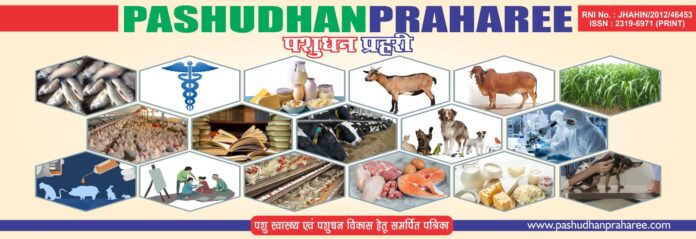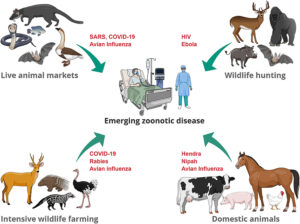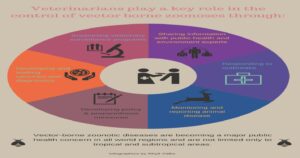ROLE OF VETERINARIANS AND ONE HEALTH IN THE FIGHT AGAINST ZOONOSES
Dr. SANJAY KUMAR BHARTI1 & GAURAV KUMAR MISHRA2 ADARSH SINGH3, NIDHI RANI4 & AAKRITI AMIT5
Head 1 & Student 2,3,4 & 5 , Department of Veterinary Anatomy,
Veterinary College, Bihar Animal Sciences University, Patna
Corresponding authors Dr SANJAY KR BHARTI- bindusuhani@gmail.com
Before coming to the actual role of veterinarians who are adding immense value and contribution under one health and in the fight against various zoonotic diseases. Let us 1st answer to what is the concept behind one health and meaning of zoonoses?
‘One Health’ is a collaborative, multisectoral and transdisciplinary approach working at the local, regional and global levels with the goal of achieving optimal health outcomes recognizing the interconnection between humans, animals, plants and their shared environment.
Origin of term ‘One Health’
As well known veterinarian, Calvin Schwabe coined the term one medicine in a veterinary textbook in 1964 which reflects the similarities between animal and human medicine and stresses the importance of collaboration between veterinarians and physicians to help solve global health problems
The word Zoonoses is simply a term used for the diseases that can be transmitted from animals to humans. According to reports of various World health agencies and a credible joint study of WHO and China into the origin of this emerging coronavirus (Severe Acute Respiratory Syndrome and Middle East Respiratory syndrome) is the most recent example of zoonoses.
As mentioned earlier about one of the most recent, problematic and mysterious zoonotic disease -> in this current covid-19 crisis when everything looks bleak a ray of hope is visible through the collaborative and coordinated efforts from one of the well known pharmaceutical company Pfizer which is laid by a famous D.V.M. Albert Bourla, discovered well effective vaccine to prevent and control this ongoing covid crisis.
It has been proven that at least 75% of emerging diseases have a zoonotic origin, having diverse animal species as their primary reservoirs. Striking examples of these zoonoses include epidemics and/or pandemics such as the Spanish flu, H1N1, SARS, MERS and Ebola.
In the context to providing awareness, fight and control of zoonotic diseases veterinarians are expertise in toxicology, epidemiology& ecology to vital the effort to understand, control, prevent, diagnose and treat environment associated disease that effect not only humans but also animals in their interrelationship.
Veterinarians play an integral role in one health because animals both impact and impacted by humans and the environment whether as clinical practitioner or as epidemiologist veterinarians are essential to advancing one health and protecting the health and safety of its three pillars- animals, humans and the environment.
In public health expertise, from issues like food safety and security to diseases that can be transferred between animals to humans, veterinarians have the unique knowledge and experience to address these issues in many ways. Likewise human and public health issues often effect animal health and welfare. For example, restrictions on sheltering animals with people during natural disaster can result in animal abandonment.
Veterinarians working in federal zoonotic investigating agencies control animal an human disease outbreaks such as food borne illness, influenza and rabies. They help ensure the safety of food processing plants, restaurants and water supplies. Veterinarians working in the environmental protection agencies (EPA) study the effects of pesticides, industries pollutants and other contaminants on animals and their consequences on humans.
Many Veterinarians are employed by the centers for disease control and prevention (CDC) to protect public health by investigating zoonotic diseases and other diseases affecting the health of animals and humans. CDC Veterinarians are involved in investigating disease outbreaks throughout the country and developing programs to prevent the spread of diseases such as Malaria, Ebola and Avian Influenza.
Veterinarians help to educate the public about prevention of zoonoses, vaccinate large number of pets for zoonotic diseases such as rabies and leptospirosis and reduce the level of ectoparasite that can transmit human disease and intestinal worms such as roundworms and hookworm which can cause serious health problems in humans.
Veterinary medicines has a responsibilities in biomedical research, ecosystem management, public health, food and agricultural systems and care of companion animals wildlife exotic animals and food animals. The expanding role of Veterinarians at CDC reflects and appreciation for this variety of contribution.
Vets are well equipped with the scientific knowledge to handle the various zoonoses and perform associated diagnostic tests. The vet man power and their hospital machinery always ready for testing any zoonotic outbreaks timely. Vets are the potential candidates to guide, educate and aware the common people for various zoonotic disease knowledge regarding its mode of transmission, fight via effective measures and control through vaccines.
Apart from this, beyond collaborative research the animal health sector particularly veterinary services, they contribute in various ways towards building a common response in zoonoses. They have also shown their commitment to support the work of human health authorities. Veterinary laboratories use their experience and expertise in high testing capacity of infectious disease to support the diagnostic capacity of human health services.
Over the past five years, a number of zoonotic diseases have emerged as either new pathological entities or known agents appearing in new areas or as new strains. Through its coordinating and information gathering functions and WHO emerging disease surveillance and control division provides the source of both practical and technical guidance that can help solve these threats to human health posed by animals.
The lessons learned from severe acute respiratory syndrome, West Nile virus, monkeypox and avian influenza are reminders of the need to view diseases globally, integrate animal and public health surveillance, epidemiology and laboratory systems and create new strategic partnerships among animals human and public health professions.
Veterinarians are essential to the detection and diagnosis of response to these threats and are integral to first line of defense and surveillance for bioterrorism agents.
In coming time it is very crucial for veterinary services to continue implement their multiple activities to strengthen the whole working body to tackle and control of various ongoing and coming zoonotic outbreaks.
In nutshell, Veterinarians are selfless, scientific people who take care not only for dumb creatures but for the society as a whole.





